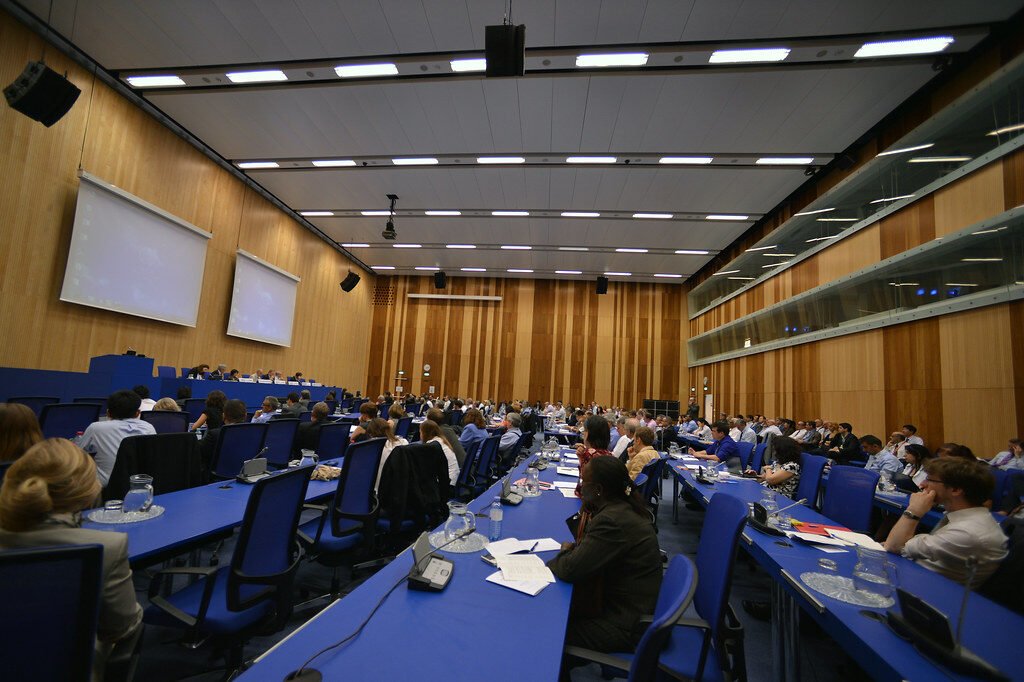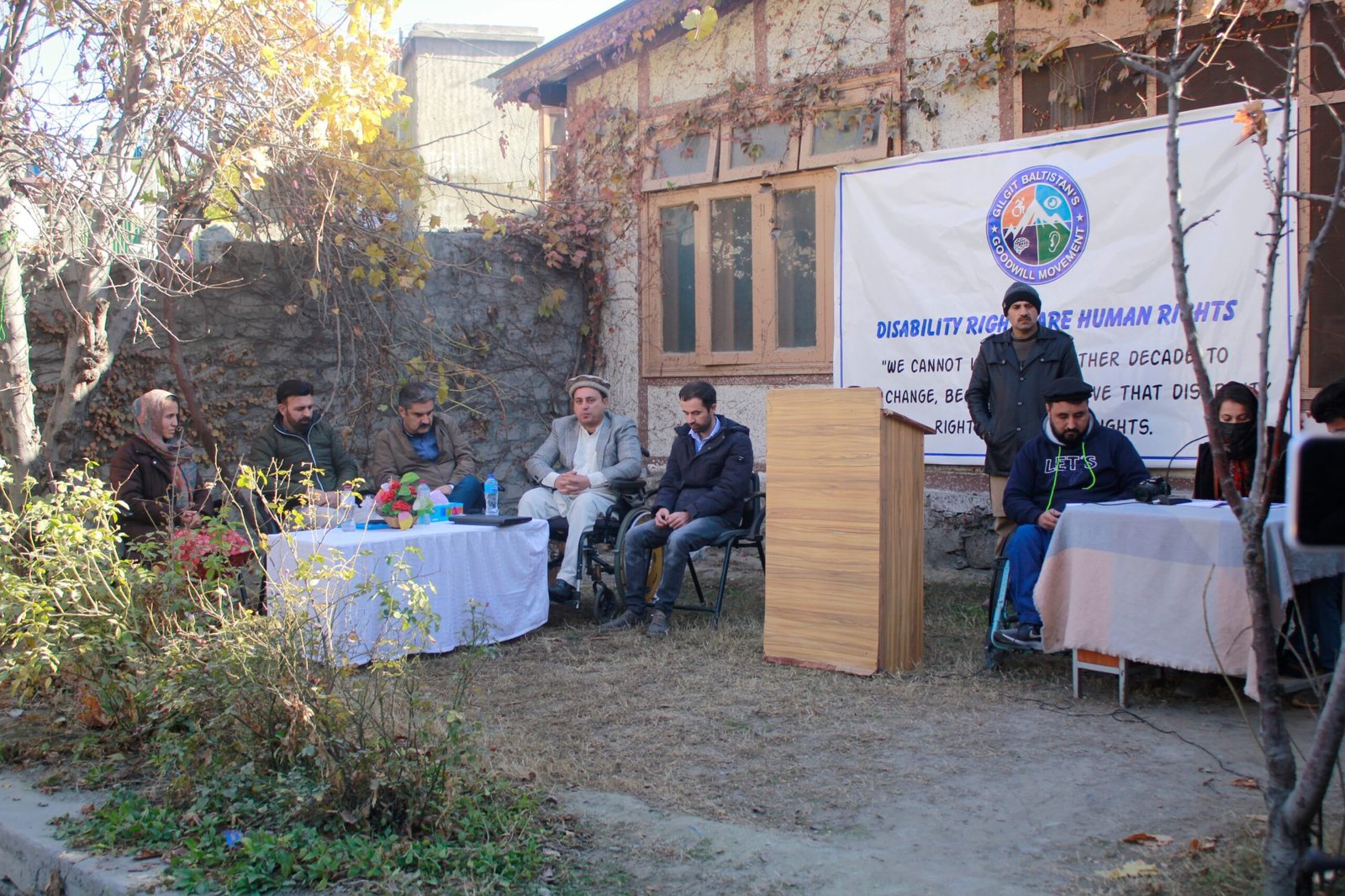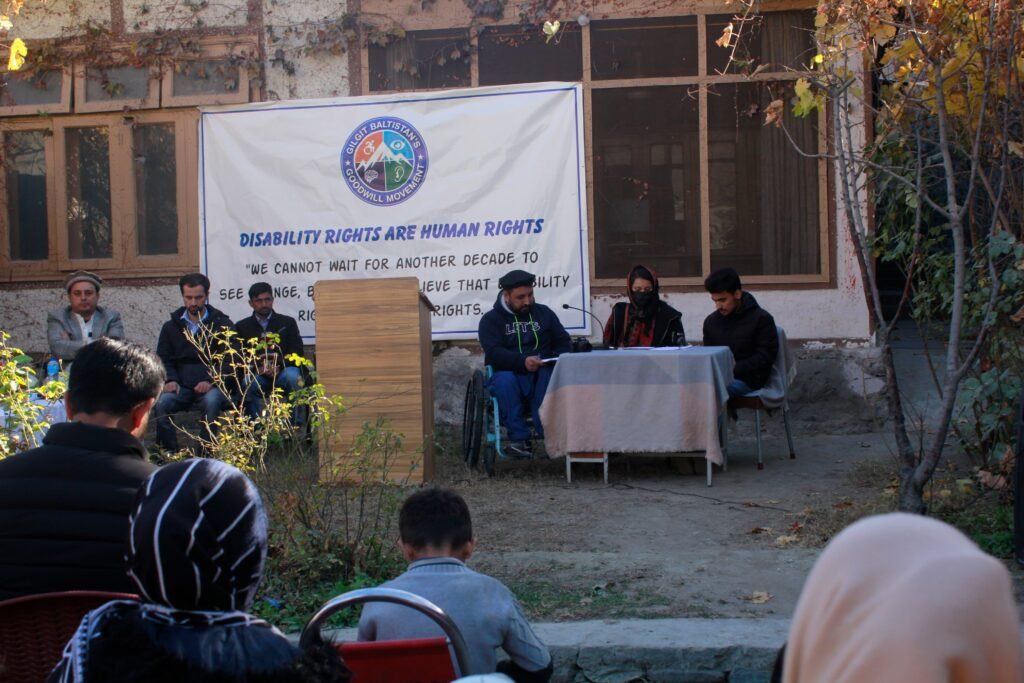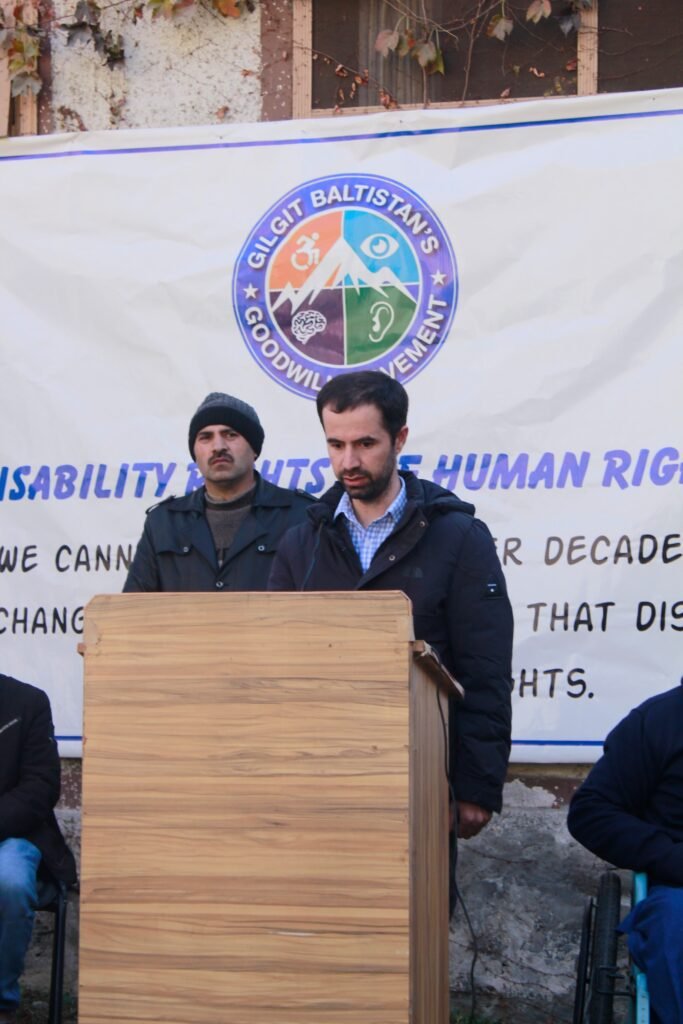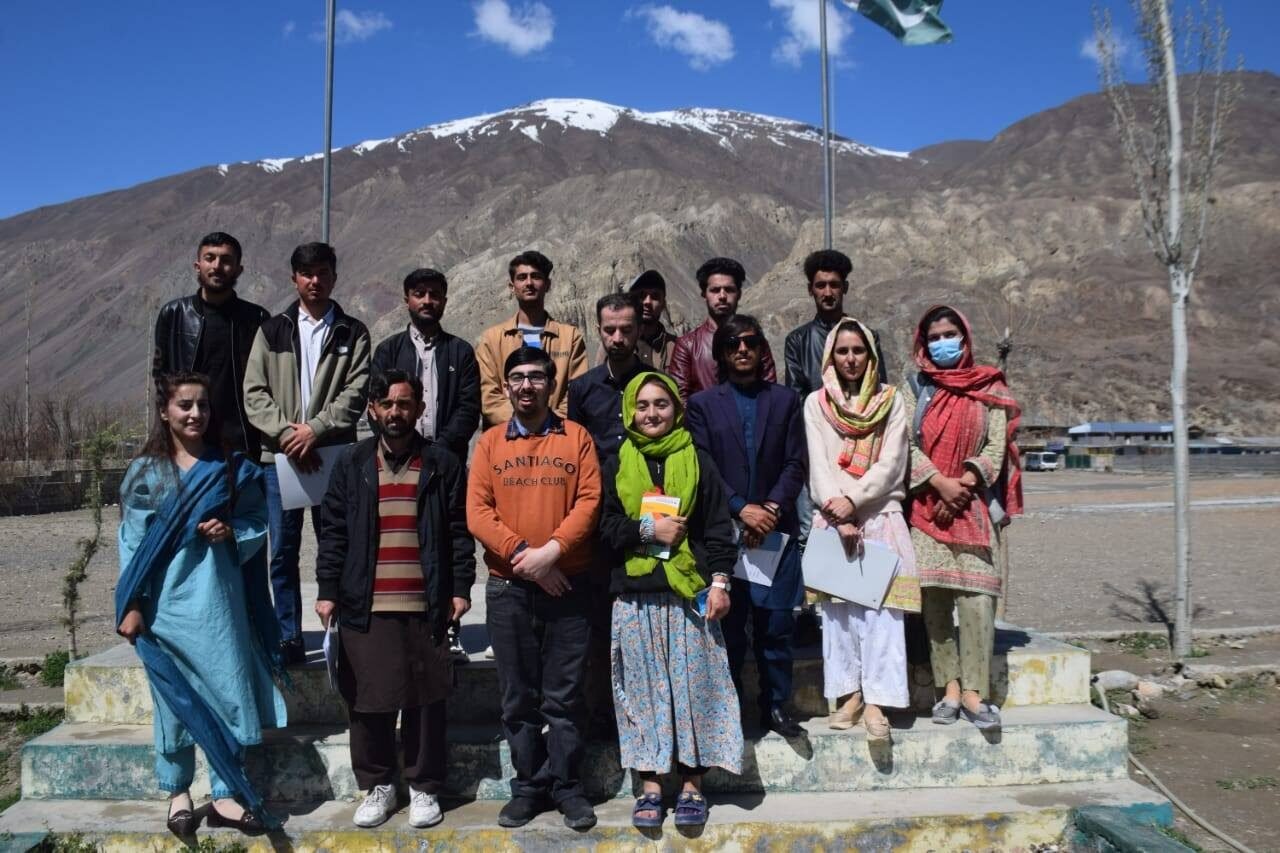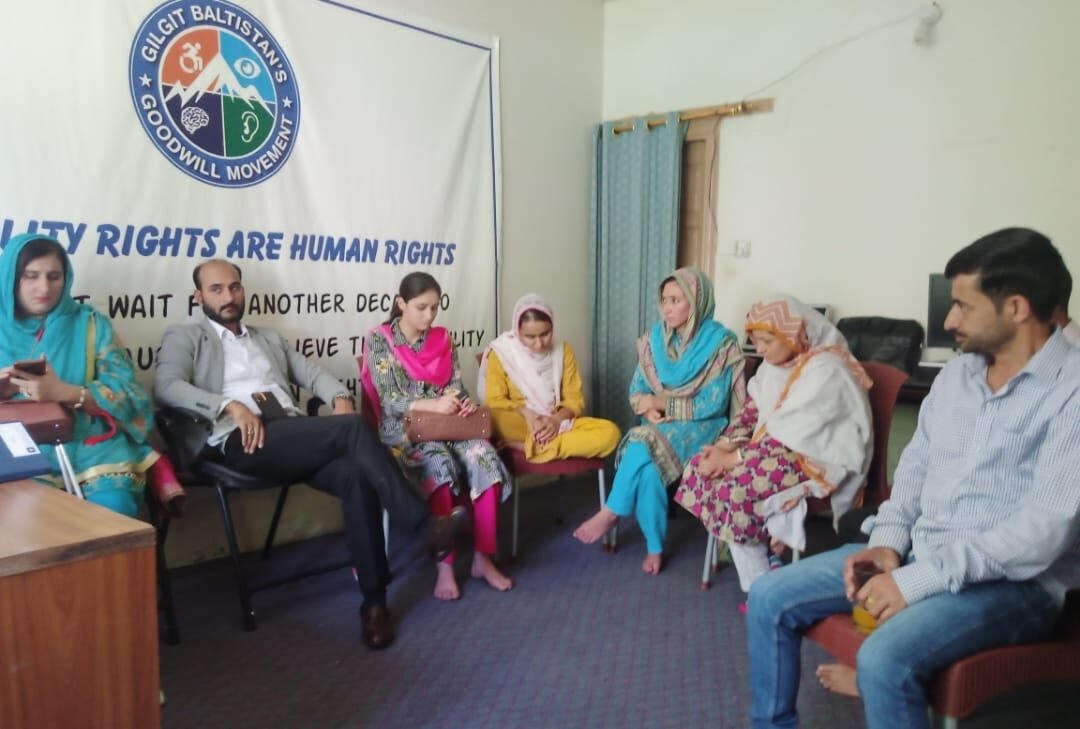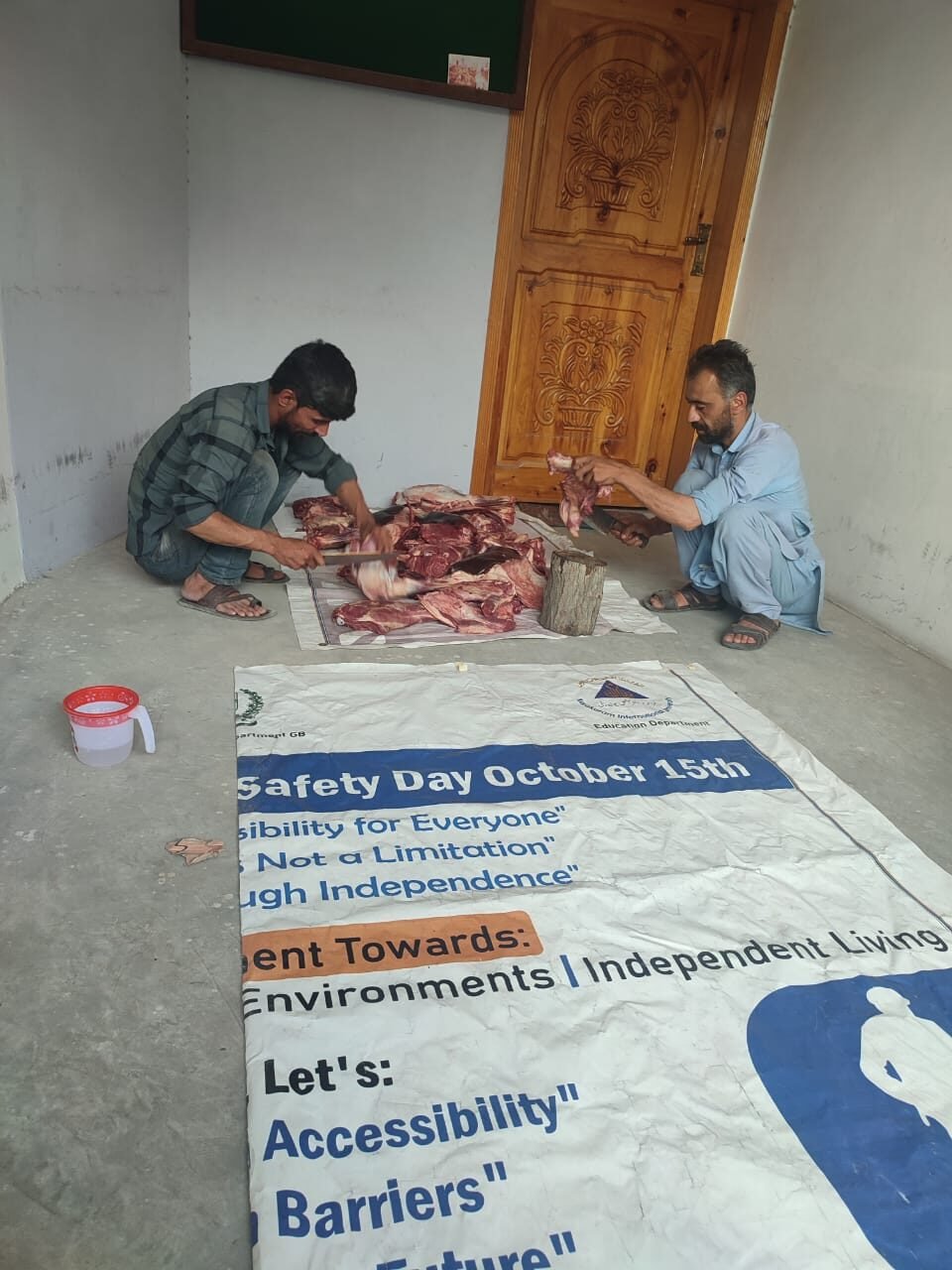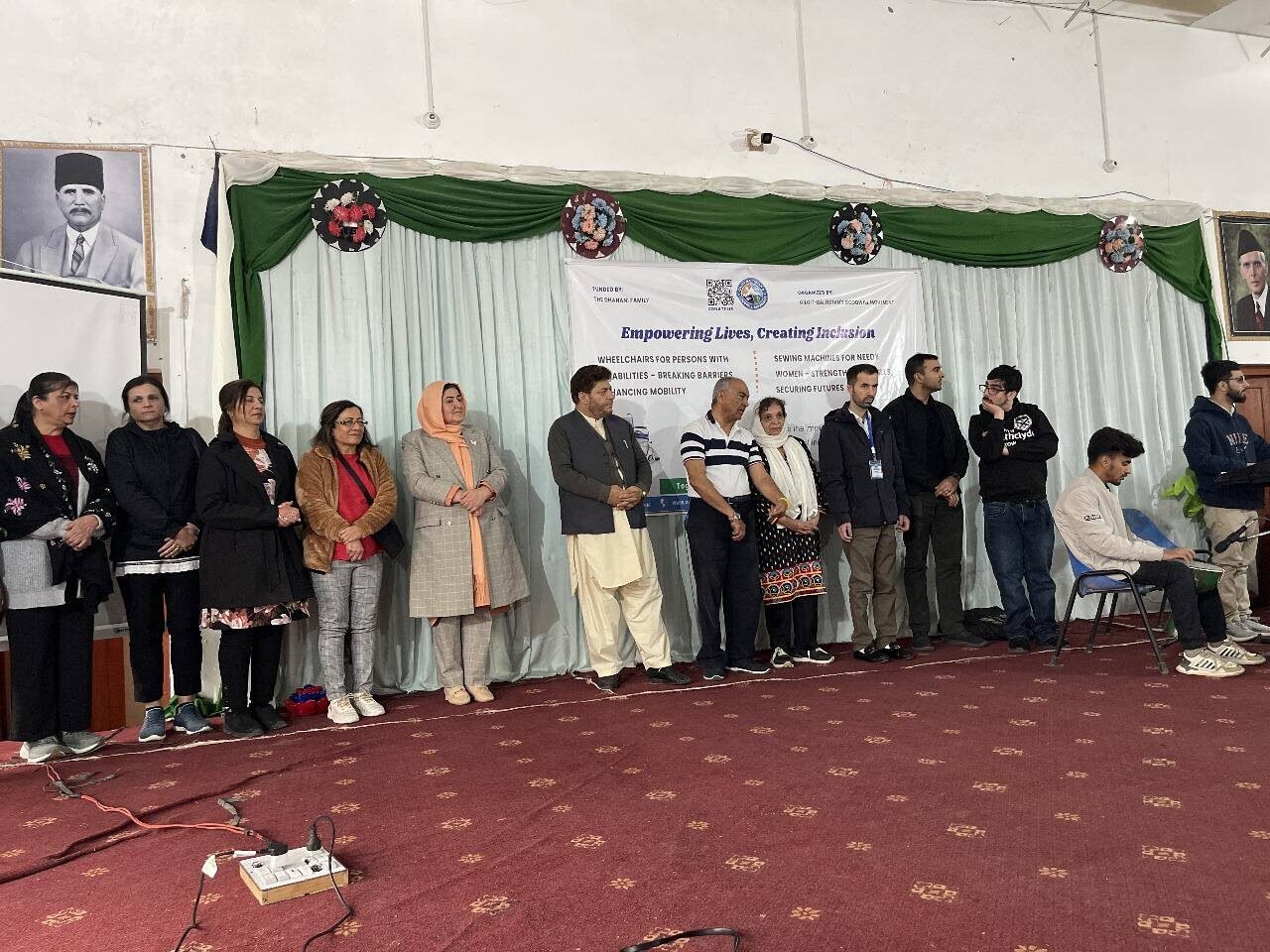11th July Ad
To the entire Ismaili community, we extend our warmest wishes for a joyful Imamat Day. To celebrate this special occasion, we have created a short clip highlighting the contributions of Gilgit Baltistan’s Goodwill Movement – GBGM not only in the wider Jamat, but in the region of Gilgit Baltistan.
Audio : The.Ismaili
Appeal to all overseas Professionals of Gilgit Baltistan
Dear Esteemed Professionals,
I trust this correspondence finds you in good health and high spirits.
My name is Ghulam Muhammad Baig, and I am currently enrolled as a student at Strathclyde University, Glasgow, pursuing a degree in Politics & International Relations. Concurrently, I am engaged in leading an NGO known as the Gilgit Baltistan’s Goodwill Movement, which is dedicated to serving the disabled communities of Gilgit Baltistan. Our operational headquarters are situated in Zulfiqarabad, Gilgit.
In essence, we are a non-profit organization committed to advocating for the rights and well-being of individuals with disabilities. Our initiatives encompass a broad spectrum, ranging from empowering disabled individuals through various skill development programs to addressing their fundamental needs by providing sustenance, shelter, and clothing to the marginalized segments within the disabled community.
We began our work in June 2021 in GB, with support from GB senior doctors working within the NHS in the UK. Now, we are seeking additional support from other professionals within the UK and US from Gilgit Baltistan.
We understand that many of you send money home as remittances, but we kindly ask you to consider the challenges faced by disabled individuals in our country. Unfortunately many of them are excluded from assistance. We are seeking small donations, even if it is $5 or $10, because every penny counts towards helping these people
We hope that you will support us in our Ramadan Fundraiser, link below,
and help disabled persons in GB.
Thank you
Kind regards
Ghulam Baig
Assessment Report on the Inclusion of the Overseas Gilgit-Baltistan and Chitral Community
1. Introduction
This report evaluates the status, challenges, and opportunities relating to the inclusion of the Overseas Gilgit-Baltistan (GB) and Chitral communities within national and international socio-economic and policy frameworks. By drawing on community feedback, diaspora organisation inputs, and Goodwill Endavours, we can assess how effectively these groups are integrated into relevant inclusion and development initiatives. The conclusions are somewhat pessimistic.
2. Background
The people of Gilgit-Baltistan and Chitral have a long tradition of overseas migration, with communities established in the Gulf States, Europe, and North America. These diaspora members contribute significantly to local economies through remittances, social investment, and skill transfer. However, despite their contributions, many feel underrepresented in national diaspora policies and platforms, leading to greater concerns about inclusion, recognition, and support.
3. Objectives
- To evaluate the level of institutional and policy inclusion of Overseas GB and Chitral communities.
- To identify barriers to equitable participation in national diaspora programs.
- To recommend policy and programmatic measures to enhance engagement and inclusion.
4. Methodology
Period – 2020 to 2025
- Data Collection: Surveys, key informant interviews, focus group discussions, and policy document reviews.
- Geographical Scope: Middle East, UK, USA, and select EU countries with notable GB and Chitral diaspora populations.
- Stakeholders Consulted: Overseas community organisations, government representatives, NGOs, and youth/women groups.
5. Key Facts
Key Facts: Limited Diaspora Contribution to Disability Inclusion in Gilgit-Baltistan and Chitral
5.1 Overview
While the Overseas Gilgit-Baltistan and Chitral (GB&C) diaspora has made significant contributions in education, health, and infrastructure, its role in advancing disability inclusion remains underdeveloped and largely overlooked. The diaspora’s investments and philanthropic activities have seldom prioritised the rights, empowerment, or accessibility needs of persons with disabilities (PWDs) in Pakistan.
5.2 Lack of Targeted Initiatives
- Minimal Inclusion in Diaspora Agendas: Most overseas community organisations focus on education scholarships, cultural events, or emergency relief, but none maintain structured programs for disability inclusion or rehabilitation.
- Charitable, Not Developmental Approach: When disability-related aid is provided, it tends to be charity-oriented (wheelchairs, medical support) rather than rights-based or capacity-building, thus failing to create long-term empowerment.
- Absence of Policy Advocacy: Despite strong social media networks and political engagement, overseas GB&C groups have not leveraged their influence to advocate for government reforms on disability inclusion or accessibility in their home regions.
5.3 Funding and Resource Allocation Gaps
- Diaspora fundraising campaigns and remittances are often directed toward visible community infrastructure (mosques, schools, roads), with little or no allocation for inclusive infrastructure such as accessible buildings, assistive technologies, or inclusive education centres.
- Disability NGOs in GB and Chitral report low engagement from overseas donors, even though the diaspora has a substantial potential to mobilize resources for inclusive initiatives.
- There is no dedicated diaspora trust or fund to support the economic empowerment of PWDs, despite rising unemployment and a lack of vocational training in these regions.
5.4 Weak Collaboration with Local Disability Organisations
- Overseas associations rarely coordinate with local disability-focused groups such as community-based rehabilitation (CBR) centres or special education schools in GB and Chitral.
- This disconnect has resulted in missed opportunities to enhance local expertise, share global best practices, or implement joint programs.
- A lack of institutional partnerships between diaspora networks and local NGOs has hindered knowledge transfer and innovation in disability inclusion.
5.5 Social and Cultural Barriers within the Diaspora
- Cultural stigma around disability remains prevalent within parts of the overseas GB&C community, leading to silence or invisibility of disabled persons in community events and leadership structures.
- There is limited awareness among overseas youth and professionals about the social model of disability or international disability rights frameworks such as the UNCRPD (United Nations Convention on the Rights of Persons with Disabilities).
- The prevailing perception of disability as a matter of personal misfortune or charity, rather than equality and rights, continues to shape community attitudes.
5.6 Impact on Disability Development in GB and Chitral
- The lack of diaspora engagement has slowed inclusive development in GB and Chitral.
- Local disability initiatives remain underfunded and isolated, with minimal international partnerships or technical support.
- Overseas professionals from these regions—many of whom are active in medicine, education, and business—have not yet mainstreamed disability inclusion into their development or CSR efforts.
- Consequently, the diaspora’s influence, while significant in other development sectors, has not translated into measurable gains for persons with disabilities.
Outcomes for us?
Intro
The Gilgit-Baltistan Goodwill Movement (GBGM) is more than just a charity — it’s a lifeline. It offers a second chance for persons with disabilities across one of Pakistan’s most remote and underserved regions. Through skills training, employment opportunities, and community inclusion, GBGM helps individuals rediscover purpose, independence, and dignity
Yet, when people visit the website, many leave inspired but not engaged. They see the vision and believe in the work, but they don’t always take the next step to donate or invest.
Why does that happen?
Even the most compassionate visitors often hesitate to act because of a few subtle barriers.
Generic reasons include:
- The message touches the heart, but not the mind.
Visitors may feel emotionally connected but still wonder what exactly their money accomplishes. They want to help but need a clear picture of how their contribution changes a life. - The story feels too broad.
“Giving a second chance” is powerful — but it’s also abstract. Donors respond more when they can visualize real people and measurable outcomes. - The call to action isn’t clear or urgent.
If the website doesn’t guide visitors toward an action (such as Donate Now or Support a Trainee), good intentions often fade. - There’s a trust gap.
Online visitors need reassurance that their contribution will be used transparently and effectively. Without visible proof — impact reports, testimonials, or updates — even well-meaning donors hesitate. - Donating feels like effort.
If the process requires too many steps or isn’t mobile-friendly, people postpone it — and usually never return.
But There’s Something Deeper — Denial
Beyond these surface reasons lies a deeper, more uncomfortable truth: denial.
During my time in Pakistan, I once met a potential donor who walked into our office, eager to contribute — until they met the people our organization serves. They hesitated. Not because they didn’t believe in our mission, but because the individuals in front of them didn’t “fit the norm.”
This moment revealed something profound: society often denies the full humanity, capability, and dignity of persons with disabilities.
We talk about inclusion — but inclusion is often conditional. Many people want to help “the disabled,” but not necessarily see them as equals, colleagues, or leaders. It’s easier to donate from a distance than to confront our own biases face to face.
This isn’t malice; it’s a kind of cultural conditioning. Ableism is real — not only in policies or infrastructure but in perception. It lives quietly in our assumptions about what a person with a disability can achieve.
And yet, in a world where Artificial Intelligence and robotics are advancing faster than ever — technologies built to augment human ability — how can we still deny opportunity to those who already live with human diversity?
If we can imagine robots performing surgeries, driving cars, or teaching classes, then surely we can reimagine a society where persons with disabilities are recognized as innovators, professionals, and equal contributors to progress.
The real challenge, then, isn’t convincing people that our work matters — it’s helping them confront the denial that keeps them from seeing the people we serve as full and capable members of society.
Outcome-Based Empowerment
This is why GBGM focuses on outcome-based projects — programs that don’t just offer charity but create measurable change:
- Skills training that leads directly to employment.
- Micro-grants that help people with disabilities start small businesses.
- Inclusive hiring partnerships with local enterprises.
- Public campaigns that normalise disability as part of human diversity, not an exception to it.
Each of these outcomes is a quiet act of resistance against denial — and a visible step toward inclusion.
“Denial keeps people apart”
Can You See Us? Breaking the Walls of Exclusion in Gilgit-Baltistan
Stop for a moment and picture the mountains here in Gilgit-Baltistan. They are stunning, right? But sometimes, behind that incredible beauty, there is a heavy silence the silence of a community that feels forgotten.
I’m talking about our Persons with Disabilities (PWDs). For them, life is not just about the natural hardship of living in the mountains it’s about a constant, grinding battle against a world that simply was not built for them.
It’s More Than Just a Lack of Ramps. It’s About Dignity.
Imagine trying to live your life when every public space the school, the bank, the clinic is a barrier.
It’s heartbreaking: there are virtually no accessible facilities. No ramps, no suitable bathrooms, and no easy way to get around. This is not just an inconvenience it’s an invisible wall that shouts, “You don’t belong here.” Our friends and neighbors are not disabled by their conditions they are disabled by our society.
And the struggle does not end there:
- No Education, No Future: Many kids can not get an education because local schools are not set up to help them. Without skills, without a degree, they have no hope of a job. They are trapped, and their entire family suffers with them.
- Laws That Don’t Matter: We have laws on the books that promise rights, jobs, and protection, but they are empty words. They are not enforced, and so the people who need them most are left vulnerable, with nowhere to turn.
The Gilgit-Baltistan’s Goodwill Movement: We Won’t Let Them Be Forgotten
That’s why the Gilgit-Baltistan’s Goodwill Movement (GBGM) exists. We are led by people who have lived this struggle, and our mission is simple: We want to make sure every single person here is treated with dignity, has equal opportunity, and can live a full life.
We are not just giving out charity we are investing in human potential.
- Real Skills, Real Jobs: We provide free training teaching digital skills, crafts, and trades. We are turning helplessness into hope, and dependency into self-respect.
- Essential Lifelines: We pay for the things that are too expensive for families to afford: crucial medicines, healthcare support, and devices like wheelchairs, white canes and hearing aids that are literally life changing.
- Our Voice, Their Rights: We are constantly fighting and advocating. We stand up to authorities, demanding that the laws meant to protect PWDs are finally put into action.
This Is Where You Come In. This Is Your Chance to Help.
When you support GBGM, you are not just clicking a “donate” button. You are personally lifting the weight off someone’s shoulders.
You are giving a student a chance to learn. You are giving an artist a way to earn a living. You are giving a family the comfort of knowing their loved one will get the medicine they need.
We can not change the whole world overnight, but together, right here in Gilgit-Baltistan, we can change everything for the people who need us most.
join our movement. Help us break these chains of exclusion and prove that goodwill is not just a kind thought it is an action that saves lives.
Gilgit-Baltistan Flood Relief Appeal
Poem
“When injustice becomes common, the world fades from sight. And when natural disasters such as floods strike, the injustice faced by persons with disabilities deepens even further. In times of crisis, they are the first to be forgotten — left without access to safe shelter, medical support, or rescue. While others may escape or rebuild, persons with disabilities often remain trapped behind invisible barriers, facing a double burden: the force of nature and the neglect of society. True justice is not only about rebuilding homes and roads after floods, but about rebuilding humanity itself — ensuring that disabled people are not left behind when the waters rise.”
The Human Cost of Climate
It is often said, ‘To err is human.’ But is it really? When will we understand that the forces of nature will not tolerate the recklessness of humans? For the past 78 years, what have we done? We have transformed a once-beautiful valley into a landscape of vulnerability, ignoring the delicate balance that sustains life. The floods, the landslides, the devastation — all are reminders that nature’s patience is not endless, and our negligence comes at a cost that affects everyone, especially the most vulnerable among us.
Qurbani 2025
The Goodwill Movement is pleased to share that the Qurbani initiative has progressed in two structured phases. On Saturday, the designated day for Qurbani (yesterday), the sacrificial cutting was carried out in accordance with all religious and ethical guidelines.
Eid Mubarak to all supporters of Gilgit-Baltistan’s Goodwill Movement!
May Allah accept your sacrifices and bless you with joy, peace, and prosperity. We extend our heartfelt gratitude to those who have generously donated their Qurbani animals to GBGM. Your kindness will bring smiles to many faces.
Thank you for being part of GBGM’s mission to spread compassion and support those in need.
#eidmubarak#gbgm#Qurbani2025#SacrificeWithPurpose
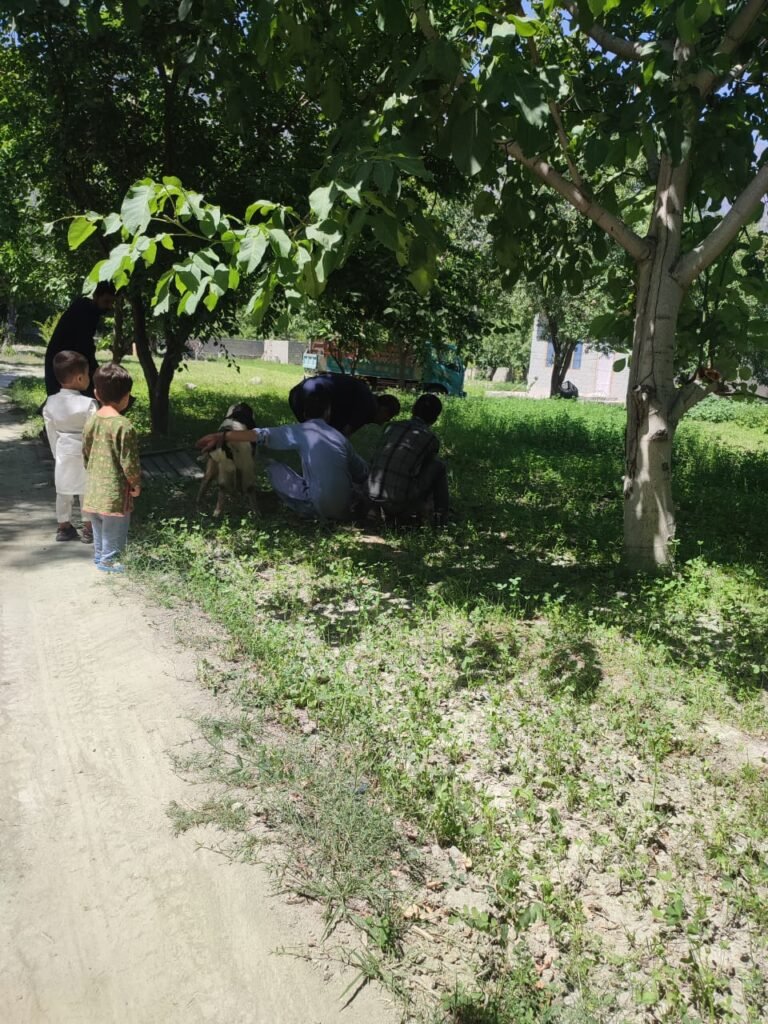
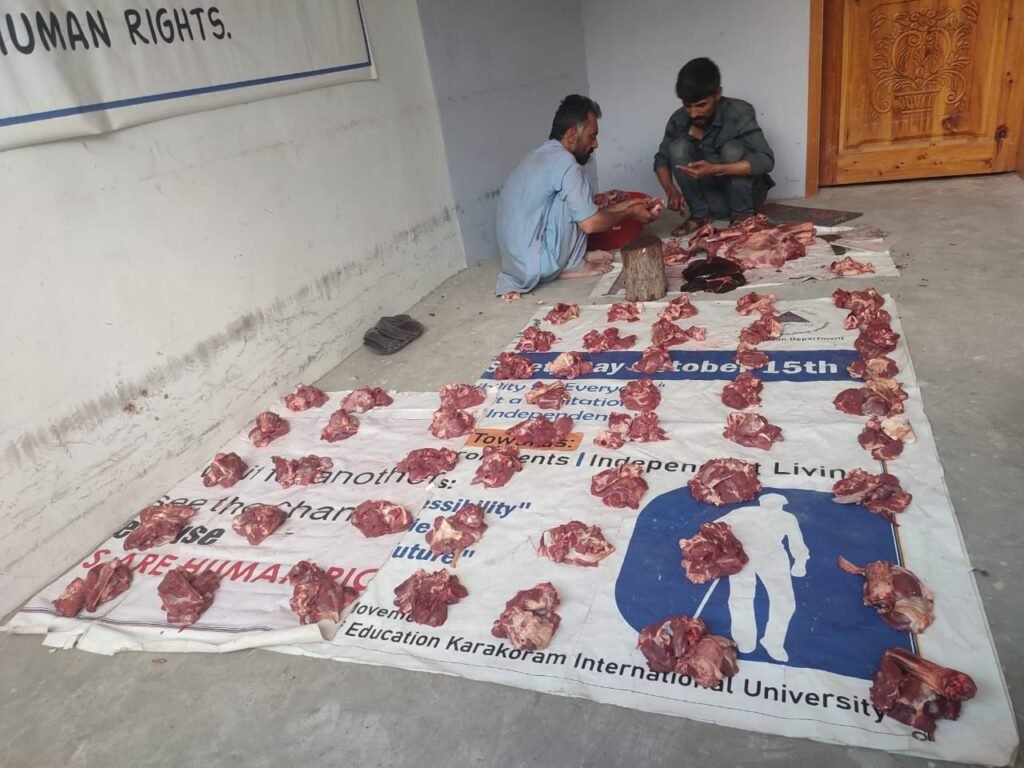
Historic Initiative Brings Empowerment to Remote Communities of Gojal and Nagar
Successful Completion of Humanitarian Outreach in Gojal
We are pleased to announce the successful completion of our third humanitarian outreach program, which took place on April 15, 2025, in the remote and high-altitude valleys of Gojal, Gilgit-Baltistan. This initiative focused on providing wheelchairs to persons with disabilities and sewing machines to economically disadvantaged and widowed women—enabling access to mobility and sustainable livelihoods in one of the northernmost and most underserved parts of the region.
This marks a significant step forward for Gojal, representing one of the first comprehensive aid distributions of its kind in the area. By promoting self-reliance and restoring dignity, our mission is to uplift individuals often left behind in broader development efforts.
Regional Assessment: Accessibility and Road Infrastructure
Despite Gojal’s breathtaking scenery and rich cultural heritage, the region continues to face substantial challenges in terms of accessibility. Many roads remain unpaved and are frequently blocked due to landslides or severe weather, particularly in the upper valleys. Reaching communities such as Passu, Hussaini, and Shimshal required extensive coordination and the dedication of local volunteers. These logistical hurdles further underscore the urgent need for long-term investment in infrastructure and regional connectivity.
Building Momentum Across Gilgit-Baltistan
This outreach in Gojal followed two earlier programs:
April 10, 2025 – Gahkuch, Punial, and Ishkoman: where we provided similar assistance to vulnerable groups.
April 12, 2025 – Yasin, Gupis, and Phandar: extending the same support in equally remote and infrastructure-poor areas.
Together, these three back-to-back initiatives represent a growing movement to promote social inclusion, address systemic inequities, and bring dignity and opportunity to those in hard-to-reach regions.
Appreciation for Our Partners and Supporters
We express our heartfelt gratitude to our donors, volunteers, and community partners. Your trust, generosity, and unwavering support are the foundation of these impactful efforts. Without you, none of this would be possible.
As we move forward, we remain steadfast in our mission to bring equity, accessibility, and hope to every corner of Gilgit-Baltistan. Plans are already underway for future initiatives to build on this momentum and reach even more communities in need.
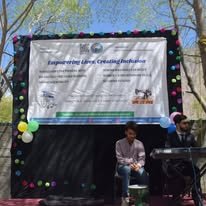
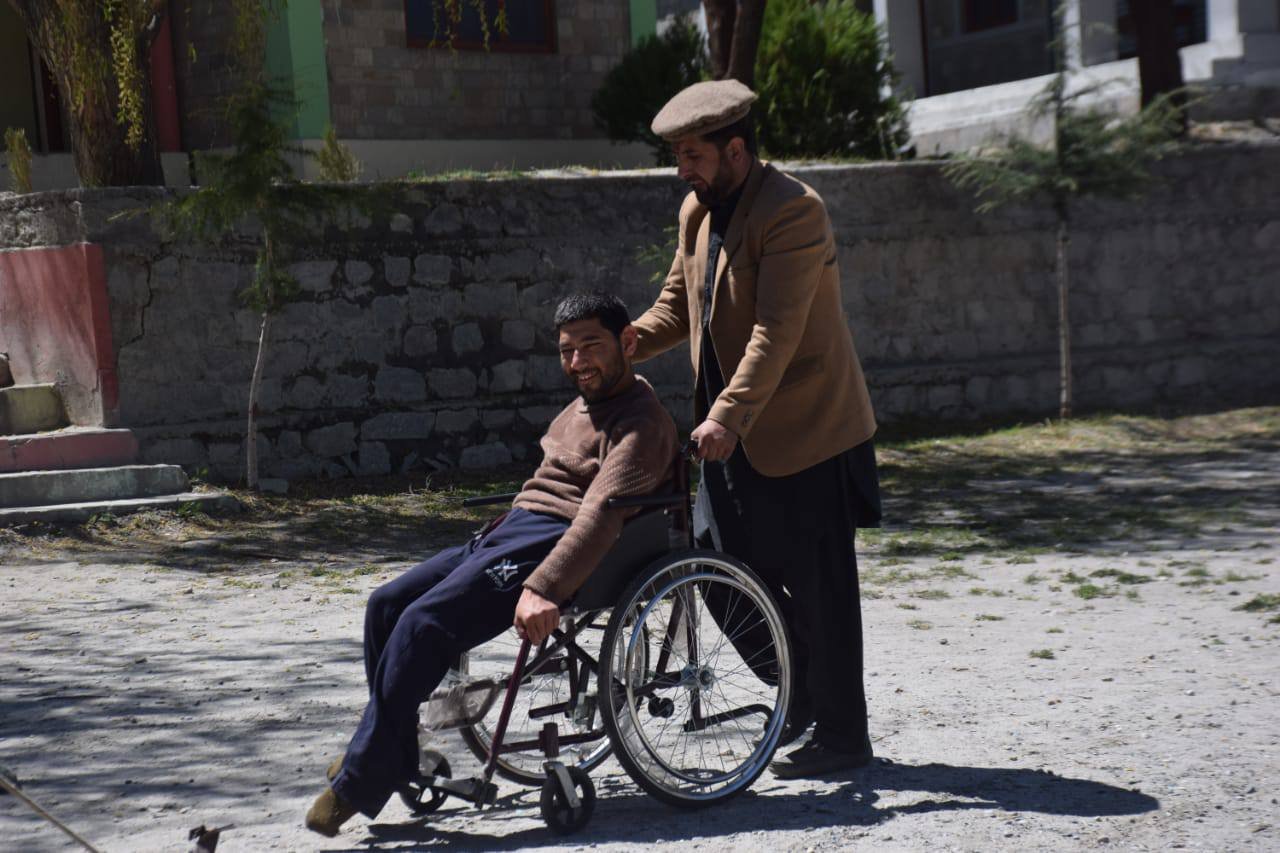
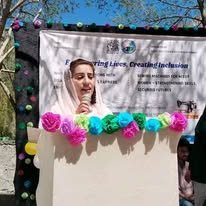
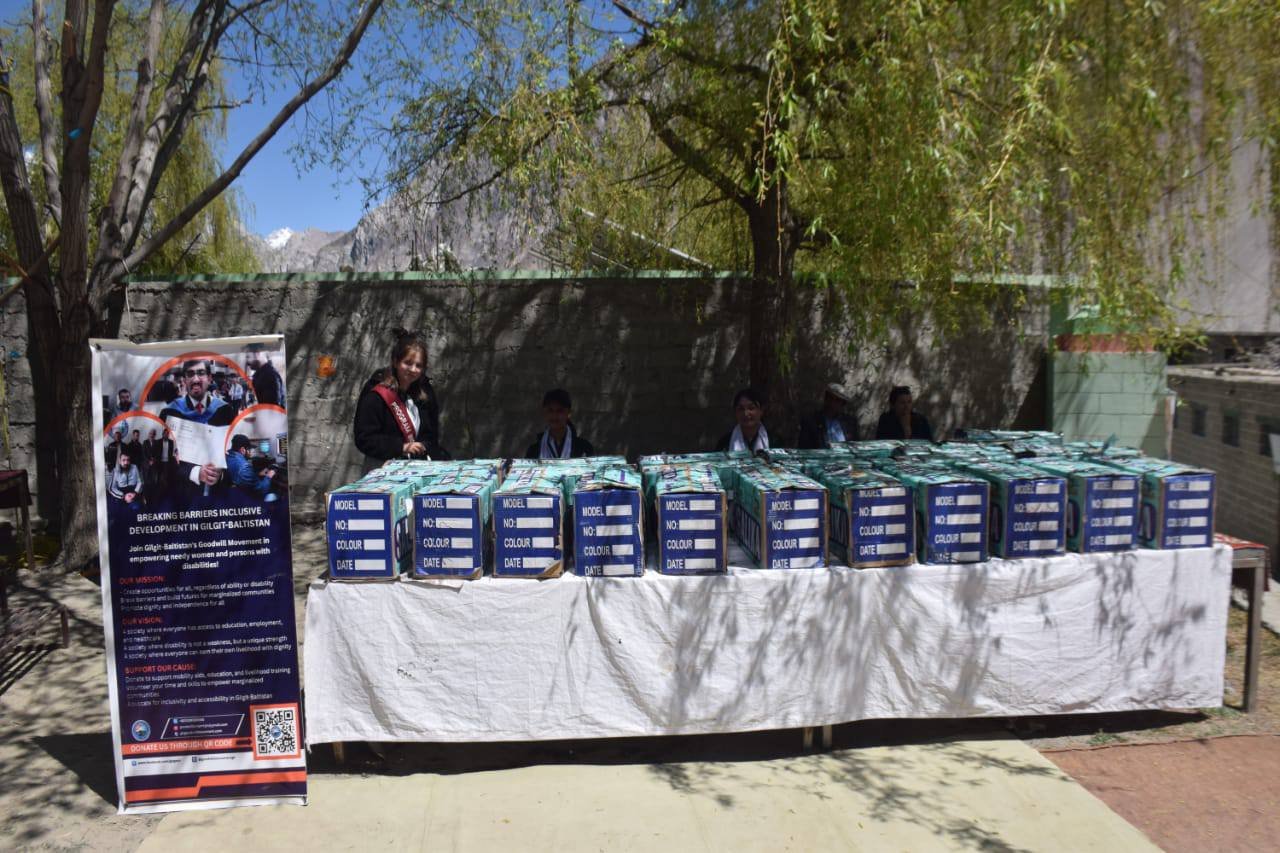
Historic Initiative Brings Empowerment to Remote Communities of Yasin, Gupis, and Phandar
We are pleased to announce the successful completion of our second humanitarian outreach program, which took place on April 12, 2025, in the remote and underserved regions of Yasin, Gupis, and Phandar in Gilgit-Baltistan. This initiative focused on providing wheelchairs to persons with disabilities and sewing machines to economically disadvantaged and widowed women, thereby enabling access to mobility and sustainable livelihoods.
This program marks a historic first for these areas, representing a significant step forward in the effort to support some of the most vulnerable members of society. By facilitating self-reliance and restoring dignity, we aim to uplift individuals who are often left behind in broader development efforts.
Regional Assessment: Accessibility and Road Infrastructure
Despite the breathtaking natural beauty of Yasin, Gupis, and Phandar, the region continues to face significant logistical challenges due to poor road infrastructure and limited accessibility. Many of the roads remain unpaved, narrow, and prone to seasonal blockages caused by landslides and harsh weather conditions. These infrastructural barriers not only isolate communities but also hinder the timely delivery of aid and essential services. Reaching beneficiaries in these areas required careful coordination, time, and the resilience of our volunteers—underscoring the need for long-term investment in regional connectivity and transportation networks.
A Continuation of Impactful Outreach
The success of this initiative follows our earlier program conducted on April 10, 2025, in Gahkuch, Punial, and Ishkoman, where similar distributions were made. These back-to-back programs are part of a broader strategy to expand social inclusion, address systemic inequities, and provide targeted assistance in hard-to-reach areas.
Appreciation for Our Partners and Supporters
We extend our heartfelt thanks to our donors, volunteers, and community partners whose generosity and dedication made these initiatives possible. Their unwavering support continues to be the foundation upon which such impactful programs are built.
As we move forward, we remain steadfast in our mission to promote equity, accessibility, and opportunity for all. Further initiatives are currently being planned to continue this momentum and reach additional communities in need.
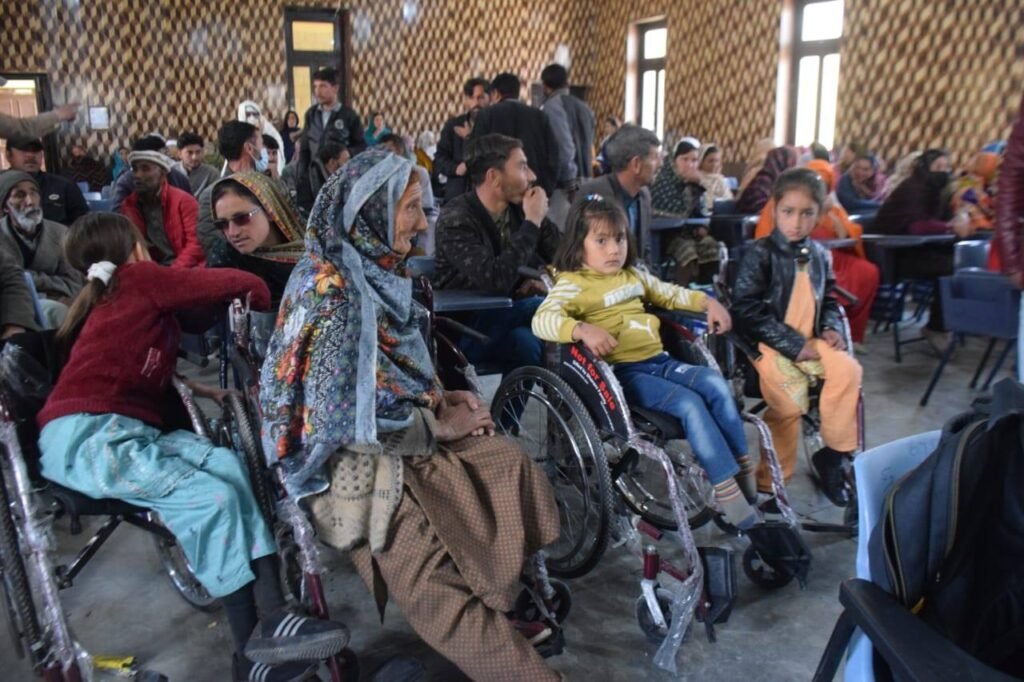
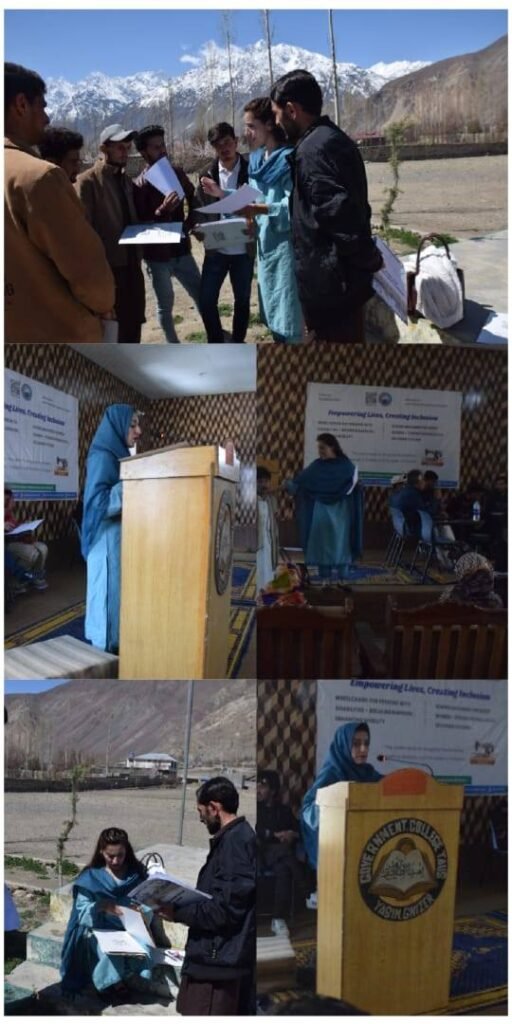
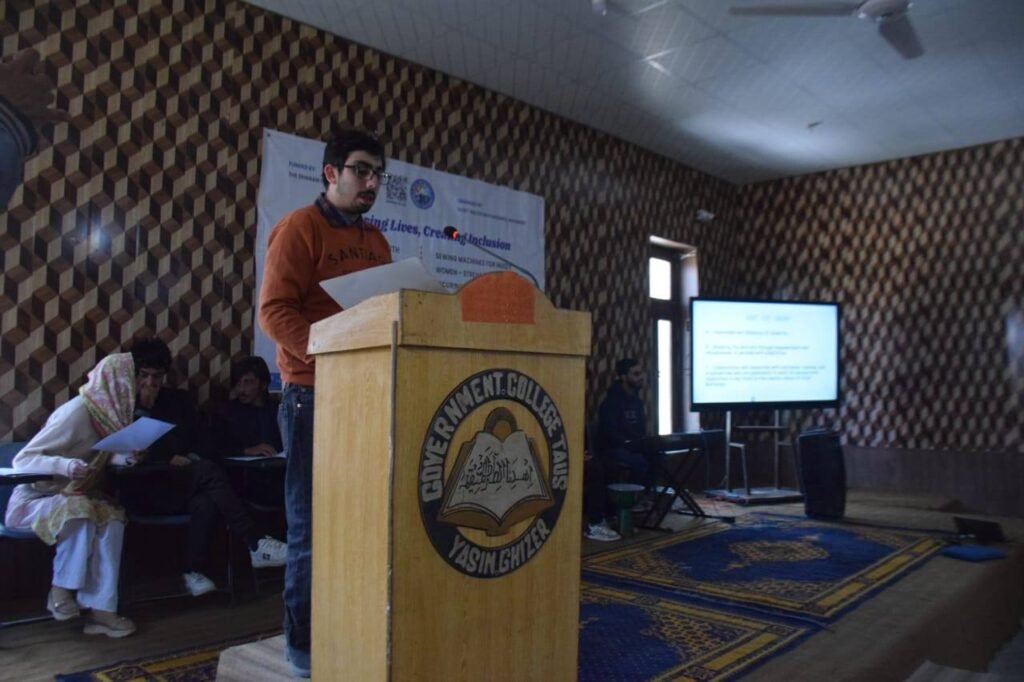
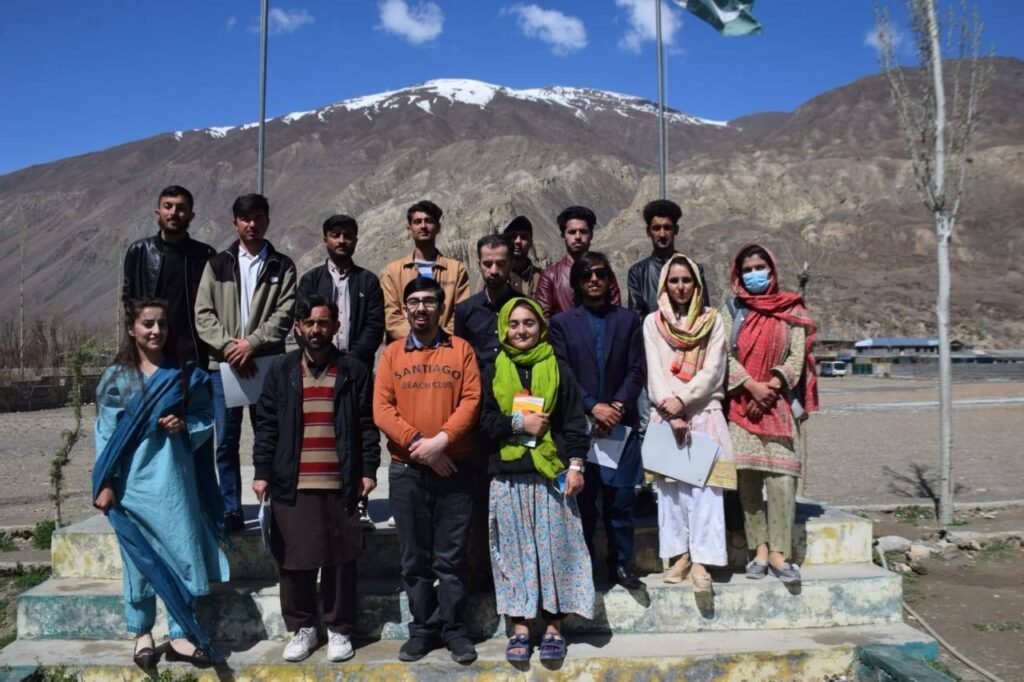
Empowering Lives : Creating Inclusive Opporunities in the Ghizer Region.
The Gilgit Baltistan Goodwill Movement (GBGM) was pleased to announce that on April 10, 2025, it had the honour of welcoming a distinguished donor delegation from the United States of America in Gakuch, Region Ghizer. The delegation, comprising members of the Dhanani and Manji families, visited the region as part of their ongoing commitment to humanitarian causes and community development in Gilgit-Baltistan. This significant visit marked a milestone in GBGM’s efforts to foster international partnerships that support vulnerable communities, particularly persons with disabilities, through inclusive and impactful initiatives.
Supporting disabled people through wheelchairs and sewing machines
The purpose of the donor delegation to Gakuch was to enable these communities to have some investment in these accessibility tools. Over 30 wheelchairs and 100 Sewing Machines were distributed within the region, marking one of the first events in the area.
We, as an organisation, are thankful to the college administration for their support during this event.


Regional Poverty Assessment
During the visit, the delegation saw firsthand the high levels of poverty in the region. Many families could not afford basic mobility aids such as wheelchairs for their children with disabilities. In several cases, parents were seen carrying their children on their backs as they moved around, highlighting the urgent need for support, not only in terms of infrastructure, but also in essential health and mobility services for those most in need.
Caption – A CP Patient, with his Carer 24/7

Project : Sewing Machines and Wheelchairs – Ghizer Valley
We are proud to announce that we have successfully distributed around 100 sewing machines and wheelchairs to needy women, widows, and persons with disabilities in Ghizer. This initiative aims to empower marginalised communities and provide them with the tools and resources they need to lead independent and fulfilling lives. Our mission is to create a positive impact in the lives of those who need it most. We believe that every individual deserves the opportunity to thrive and contribute to their community. Through our initiatives, we strive to promote inclusivity, equality, and social justice. Your support and contributions can help us reach more people and create a lasting impact. Together, we can build a brighter future for our community.






